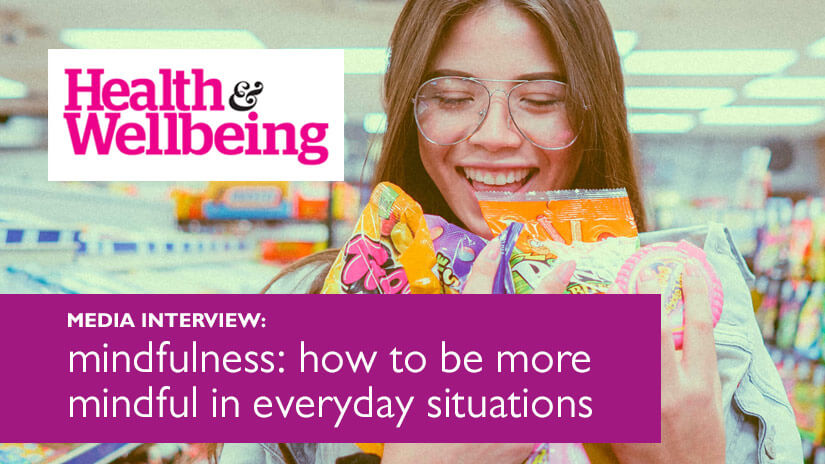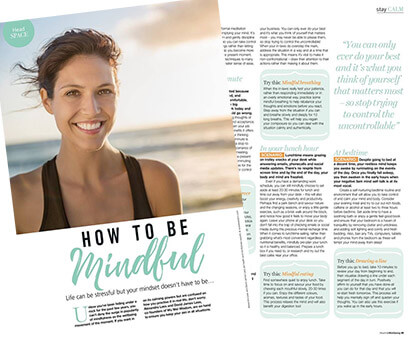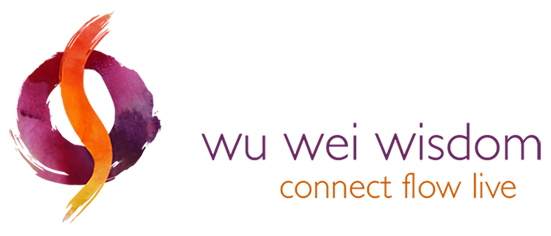mindfulness: how to be more mindful in everyday situations

summary
In this interview for Health & Wellbeing Magazine, Alexandra Lees and David James Lees share their practical mindfulness hacks and simple exercises to help you be more mindful at work, rest and play.
“…Mindfulness will help you become more balanced and focussed in the present moment. You can apply mindfulness techniques to everyday situations for a greater sense of ease, creativity and inner peace…”

mindfulness basics
Mindfulness is not just a formal meditation practice, nor is it about trying to empty your mind.
Mindfulness means learning to how to calm and gently discipline your mind and emotions, so you can take control of your thoughts and feelings, rather than letting them control you.
Mindfulness will help you become more balanced and focussed in the present moment. You can apply mindfulness techniques to most every-day situations for a greater sense of ease, creativity and inner peace.
mindfulness on your commute
SCENARIO: You’re irritated because your train or bus was delayed, and conditions onboard are very uncomfortable. You’re also fretting about the big presentation you have at work today and imagining everything that could go wrong…
Mindfulness means swopping thoughts of frustration for ones of gratitude and acceptance. Remind yourself why you have chosen your job and all the personal and career benefits it offers you. This will help rebalance your thinking and reinforce why the cramped commute is worthwhile.
Be mindful to also put a stop to projecting ahead onto worst-case scenarios of what could or may happen at your meeting. Instead, refocus your attention on the present moment. Make the most of your commuting time by calmly mapping out your ideas for the meeting rather than trying to predict or control the unknown.
Mindful Exercise: ‘Become the Observer’
Sometimes you can be so much ‘in your head’ that you forget to see the bigger picture. On your commute, why not look out of the window and for 5-10 minutes focus only on your external surroundings, but in a neutral, non-judgmental way. Notice the weather and the scenery or the general minutiae of everyday life around you. This exercise will draw your attention away from your racing thoughts and give you a greater sense of perspective.
mindfulness and your in-laws
SCENARIO: You and your in-laws are like chalk and cheese. You’re also upset and angry because of their constant interfering and you suspect they also criticise you behind your back…
Mindfulness means taking time out to quietly reflect on your expectations about your in-laws. Are they unrealistic? Do you accept that they have a right to a different set of opinions or beliefs to you?
You should also mindfully acknowledge that what other people think of you, including your in-laws, is actually none of your business. You can only ever do your best and it’s what YOU think of YOU that matters most. You may never be able to please them, so stop trying to control the uncontrollable!
When your in-laws do overstep the mark, mindfully address the situation in a way, and at a time, that is appropriate. This means it’s vital to make it non-confrontational – draw their attention to their actions rather than making it personal about them.
Mindful Exercise: ‘Mindful Breathing’
When the in-laws really test your patience, rather than responding immediately or in an overly emotional way, practice some mindful breathing to help rebalance your thoughts and emotions before you react. Step away from the situation if you can and breathe slowly and deeply for ten long breaths. This will help you regain your composure, so you can deal with the situation calmly and authentically.
mindfulness and shopping
SCENARIO: It’s the end of a pressured month at work. You’ve just been paid and so hit the shops with your friends. You end up maxing-out on your credit card but justify it as you’ve been super-stressed and deserve a ‘treat’ to make yourself feel better…
Rather than falling for enticing high-street offers and impulse spending, mindfulness means stepping back and asking yourself: Do really need this item or am I just buying it to cheer myself up or because of peer-pressure from friends? …Can I afford this item? …Would it be better to save the money for something else?
Many people use shopping as a form of self-soothing or to avoid uncomfortable issues in their life. But this tactic will never address the root cause of the problem and may create further issues if you slide into debt. So, mindfulness means digging deeper, doing some self-enquiry work, and asking yourself why you need to spend to make yourself feel good about life.
Mindful Exercise: ‘Practice the Pause’
Before you make a purchase, mindfully pause and take time out. This could mean asking the shop assistant to put something behind the counter for an hour… or, if you are shopping online, add the item to your favourites list rather than the check-out cart. Walking away from the thrill of an immediate purchase will help settle your emotions so you can calmly reassess whether you REALLY need to buy!
mindfulness in your lunch break
SCENARIO: Lunchtime means grazing on trolley snacks at your desk whilst multi-tasking emails, phone calls and social media updates. There’s no respite from screen time and by the end of the day, your body and mind are frazzled…
Even if you have a demanding work schedule, you can still mindfully choose to set aside at least 20-30 minutes for lunch and ‘time out’ away from your desk. This will also boost your energy, creativity and productivity.
Perhaps find a park bench and savour nature and the changing seasons… or enjoy a little gentle exercise, such as a brisk walk around the block, and notice how good it feels to move your body again. Leave your phone at your desk so you don’t fall into the trap of checking emails or social media during this precious mental ‘recharge time’.
When it comes to lunchtime eating, rather than grabbing what’s most convenient regardless of nutritional benefits, mindfully pre-plan your lunch so it is healthy and balanced. Prepare a lunch box if you need to or research and try out the best lunchtime cafes near your office.
Mindful Exercise: ‘Mindful Eating’
Find somewhere quiet to enjoy lunch. Take time to mindfully focus on and savour your food by chewing each mouthful slowly, 20-30 times if you can. Enjoy the different colours, aromas, textures and tastes of your food. This process relaxes the mind and will also benefit your digestion too!
mindfulness at bedtime
SCENARIO: Despite going to bed on time, your restless mind keeps you awake by ruminating on the events of the day. Once you finally fall asleep you then awaken in the early hours when your negative ‘3-AM Mind’ self-talk is at its most vocal…
Mindfulness means creating a self-nurturing bedtime routine and environment that will allow you to take control of and calm your mind and body.
Consider your evening diet and cut out rich foods, caffeine or alcohol at least 2-3 hours before bedtime. Set aside time to have a soothing bath or enjoy a gentle feel-good book or film.
Ensure your bedroom is a haven of tranquillity. Remove clutter and untidiness, add soft lighting and comfy and fresh bedding. Also, ban any TVs, computers, tablets and phones from the bedroom as these will tempt your mind away from sleep!
Mindful Exercise: ‘Drawing a Line’
Before you go to bed, take ten minutes to review your day from beginning to end. Visualise drawing a marker-pen line under each segment of the day in turn. Positively affirm to yourself that you have done all you can do for that day and that you will re-start fresh tomorrow. This process will help you mentally ‘sign off’ your day and quieten your thoughts. You can also use this exercise if you awake in the early hours.
want more support
Discover how we can help you rebalance your health and wellbeing with our one-to-one sessions and live events.
You can also:
- join our free Wu Wei Wisdom Facebook Group where you’ll find lots more guidance and discussion
- sign up for our free weekly email newsletter with all our latest teachings and news.
If you have any questions or would like more information on our work please contact us – we’re always happy to help.
like this post?
Please share it! This helps to pass on the positive Qi of our work to others who may benefit…
